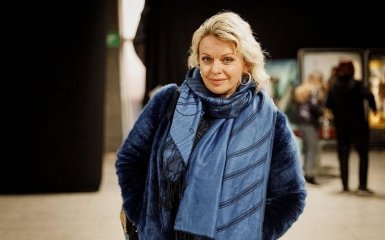Ukrainian actress Irma Vitovska is convinced that when a particular culture begins to call itself “great”, it always indicates danger. She spoke with online.ua correspondent Ivan Hrynevych about the toxicity of Russian literature, the destruction of cultures and the eradication of Soviet habits.
I want to return to the “Lesya + Roma” issue. There is a unique edition of “Lesya + Roma in Moscow”. There, you started taking a public stance before it became mainstream. What other Soviet habits can still be found in Ukrainian society?
I am also a Soviet child, and independence came into my life when I finished senior school. I think it's with us forever. Recently, my friend was ranked “junior lieutenant”, and I almost wrote to him “, Junior lieutenant, young one boy” [a reference to a 1992 song by Russian singer Irina Allegrova — Ed.]. It's good that I hit myself in the arm. You can't throw away all this stratum.
Yes, you are etching all this history out of yourself. What for? Not for myself, but for the sake of my son, for the sake of this not continuing.
But there are such things, and a lot of people are phonies. Firstly, all the literature that has now fallen under toxicity — both dissident and imperial. I liked what Andriy Bondar wrote after they covered the Mariupol Drama Theater with a net: “Now you can call Russian culture a “Potemkin's culture”. [a reference to the idiom “Potemkin village” — Ed.]
Therefore, the fact that even worthy representatives of the past Russian culture have fallen under the rink of toxicity is, unfortunately, the result of what people do today. That's how it works.
We all understand that someone gravitates towards specific authors, grew up on something, can't mentally break away, regrets or regrets this or that creativity. It is normal.
There is a certain period of sterility that will last for two generations. But, of course, all these authors will not disappear; many countries will keep them — those that do not have such a bloody history.
Read the first part of the interview with Irma Vitovska: Ukrainians quickly learn not only to shoot movies but also to fight — Irma Vitovska.
About the harmfulness of “great Russian culture”
Look at world literature. It is no less beautiful, if not more so. We talked with Ihor Demydovych Pasichnyk — the rector of the Ostroh Academy, where I am a part-time student this year — about how strange it is when a nation begins to add some priority word to itself. For example, “great Russian culture”.
I have never heard of Great British culture, I have never heard of “great French culture”. But in 1928, the Germans began to use “high German culture”. We see where this leads.
When there's a lumpen, sorry, I'll call it names because there's a lumpen that doesn't read its culture, doesn't know its authors. He hangs their portraits in schools in the classroom, and he can distinguish Pushkin, who has certain non-European features, from Dostoevsky, but, in principle, who wrote this or that work — he does not care.
However, he hears the word “great” for himself and understands that he is “great”. It creates a big problem for all other nations because this disease, which comes from above and is fueled by these features, works like a light bulb on Pavlov's dog.
And these people, not knowing what they carry, who are the representatives of this culture, attribute themselves to the “great Russian culture”. And this word “great” goes forward.

Irma Vitovska took part in the #saveUkrainianChildren action on June 4 (photo: facebook.com/irmcya)
Here, we see what happened to the German people at one time; it is happening to the Russian people who inhabit the Russian Federation. Although they went through their dehumanization, the destruction of their cultures, their languages, and their identities, they fell into such a compote where they knew three names each, like the Ukrainian nation at one time, which was also silenced.
We knew only [Ivan] Franko, [Taras] Shevchenko, Lesya Ukrainka, and the rest — a selectively censored layer. And these people still have such an archaic history. However, everything else was destroyed.
Therefore, I think that this is a question when Ukraine can now, as a platform, say: “If a nation begins to add something special to itself, not a contribution to world culture, then look there for fascism and the seeds of Nazism”.
Read the second part of the interview with Irma Vitovska: You must have the same worldview with this state to influence it — Irma Vitovska

